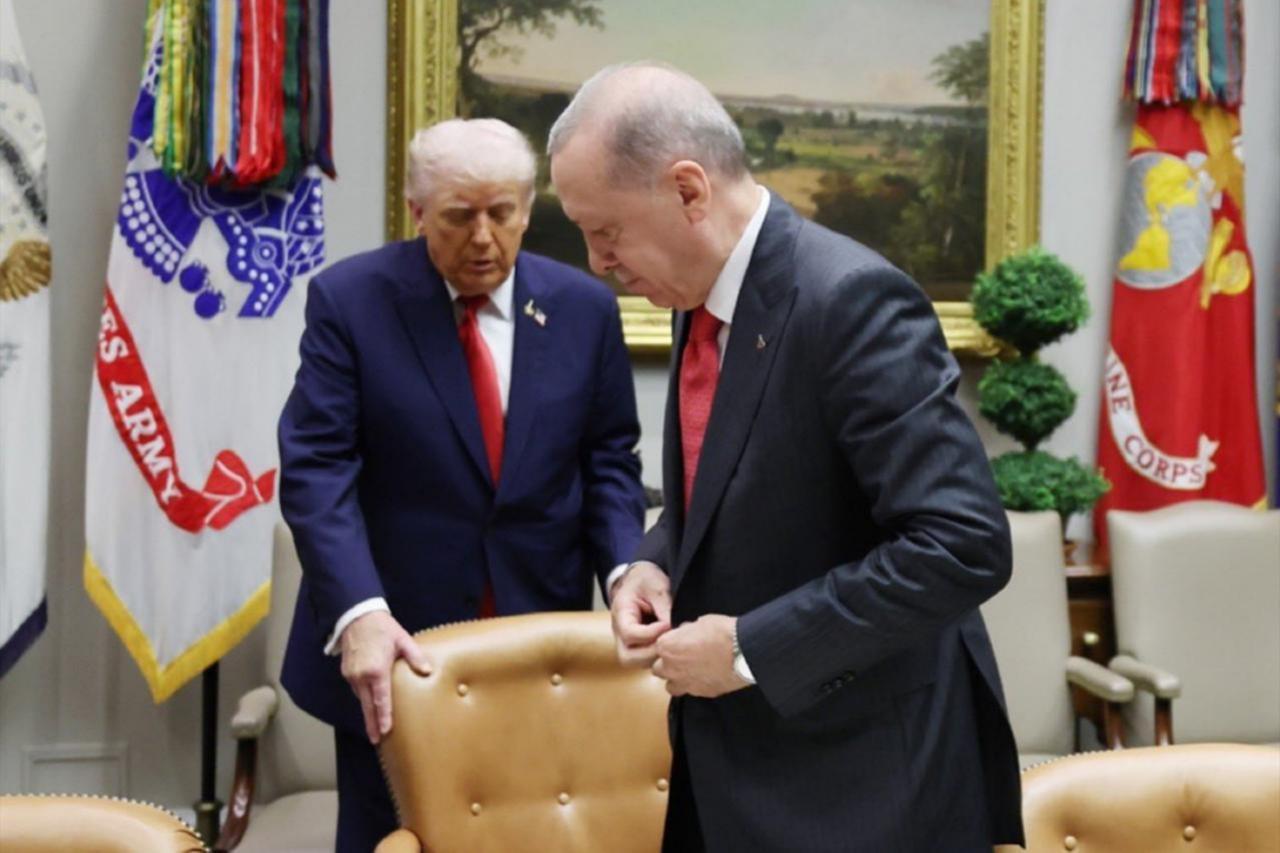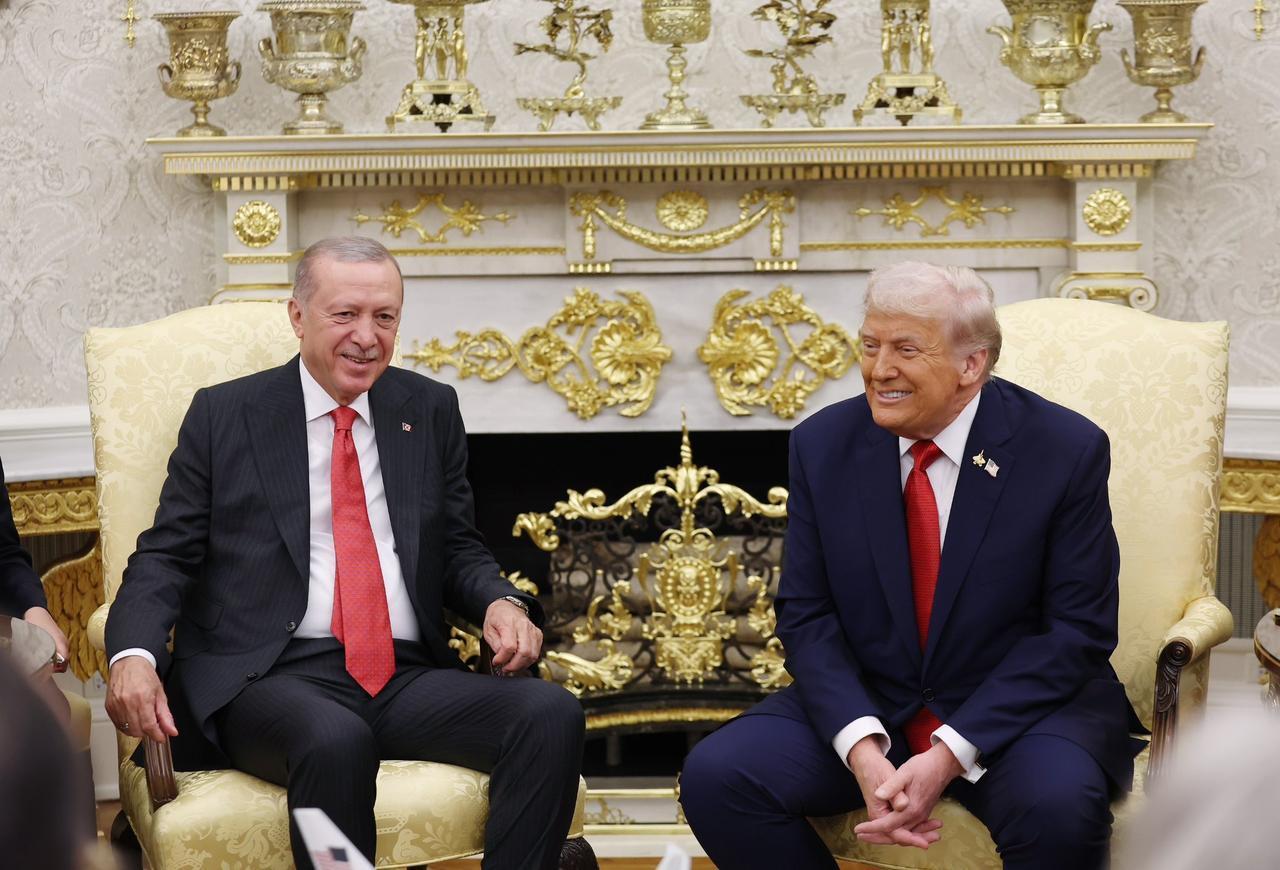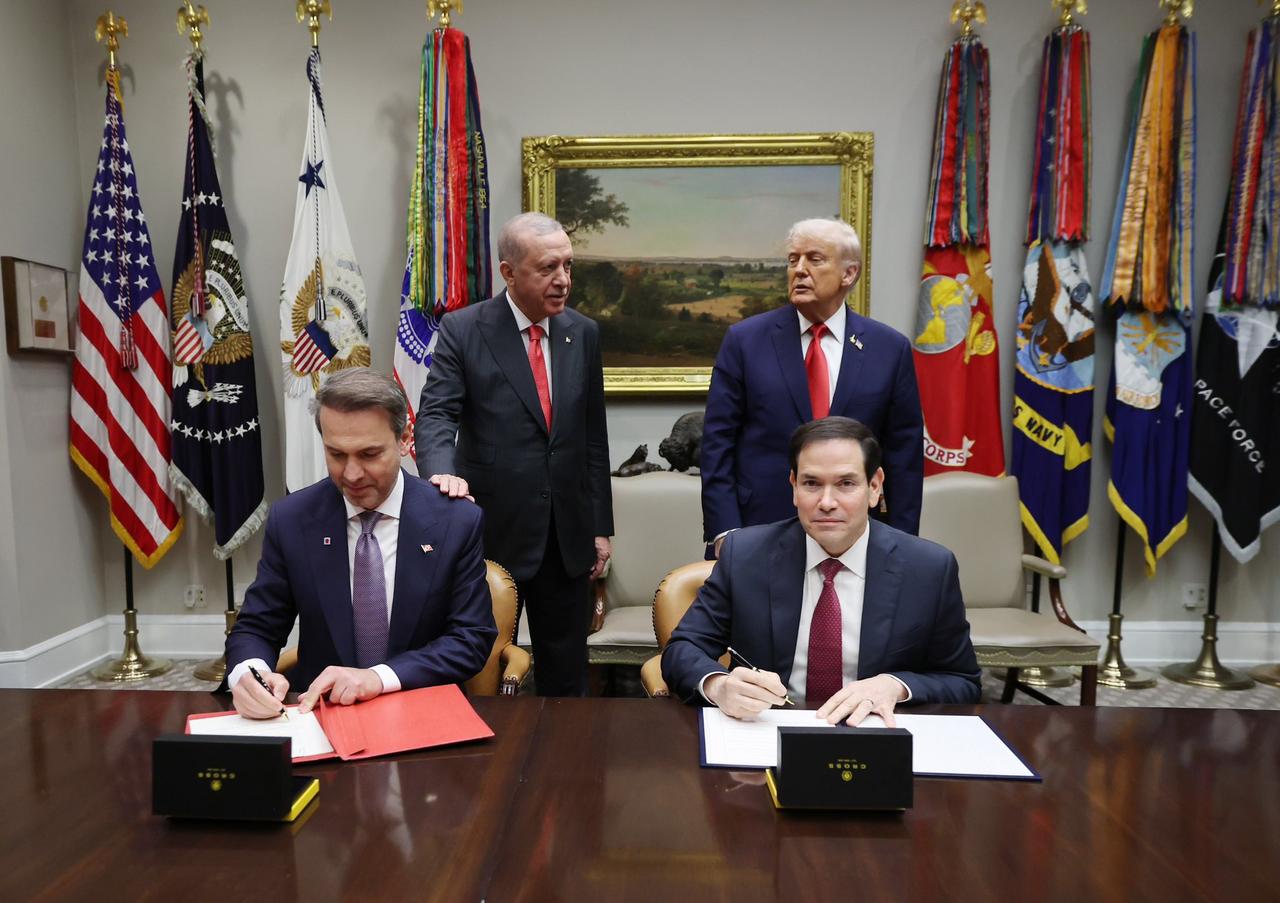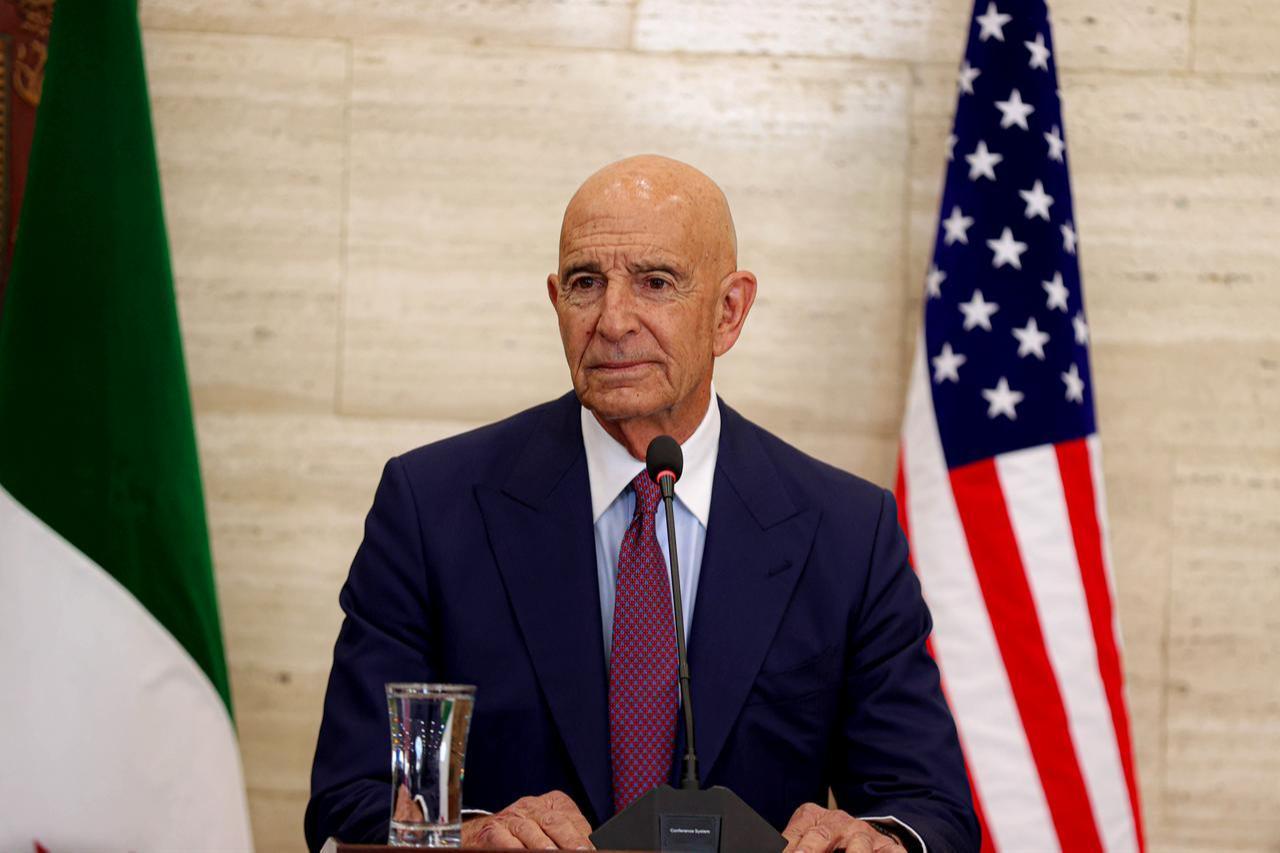
The long-awaited meeting between U.S. President Donald Trump and President Recep Tayyip Erdogan took place on Thursday at the White House, with both sides expressing gratitude for renewed cooperation on stalled issues, including F-35 sales, the lifting of CAATSA sanctions, a landmark nuclear energy deal, the Turkish Airlines Boeing purchase, and a shared vision on developments in Syria.
The visit marked Erdogan’s first trip to Washington in six years, made in connection with his attendance at the 80th UN General Assembly in New York.
The meeting between U.S. President Donald Trump and President Recep Tayyip Erdogan began at the Oval Office with a joint press conference.
Trump opened his remarks by describing Erdogan as "a highly respected man," and said the talks would focus on key issues including the potential sale of F-16 and F-35 fighter jets to Türkiye, as well as regional conflicts.
He also addressed the Countering America’s Adversaries Through Sanctions Act (CAATSA), which imposed restrictions on Türkiye following its purchase of the Russian S-400 missile defense system. Trump noted that the sanctions "could be lifted immediately if the meeting goes well," signaling possible movement on a longstanding point of tension between the two NATO allies.
Turning to the developments in Syria, Trump said he had lifted U.S. sanctions at Erdogan’s request, describing the move as recognition of what he called a Turkish victory in the country. "The victory in Syria belonged to Erdogan, and it was a victory for Türkiye," Trump said, adding that the decision was taken in response to Ankara’s role on the ground.
"I believe we will have the opportunity to discuss in detail the F-35 issue, the F-16 issue, as well as relations regarding Halkbank," Erdogan told reporters.
Erdogan said U.S.-Türkiye relations have experienced "a different process" during both of Trump's presidential terms. "We are experiencing a different process in Turkish-American relations, during both the first and second terms of Mr. Trump."
The Turkish president pledged action on reopening the Halki Seminary, the Greek Orthodox theological school closed since 1971. "We are ready to do whatever is necessary regarding the Halki Seminary. When I return, I will have the opportunity to discuss this matter with Patriarch Bartholomew," he said.
Asked about regional cooperation with Trump, Erdogan expressed optimism: "I say this because I believe it. I believe that together, hand in hand, we will overcome these challenges in the region."

After the press conference, both leaders began their closed-door meeting, which lasted 2 hours and 18 minutes. The bilateral session, followed by a working lunch, was held without media access and focused on a wide range of political, defense, and economic issues.
During the talks, a memorandum of understanding on strategic civil nuclear cooperation was signed by Turkish Energy and Natural Resources Minister Alparslan Bayraktar and U.S. Secretary of State Marco Rubio. “We have started a new process that will further deepen the deep-rooted and multidimensional partnership between Türkiye and the United States in the field of nuclear energy,” Bayraktar said in a statement after the meeting.
While no further details were provided by the Turkish Energy Ministry, officials noted that both countries have been engaged in negotiations on the construction of large-scale nuclear power plants as well as small modular reactors. The agreement was described as a step toward expanding bilateral collaboration in the civilian energy field.

In addition to the discussions, photos and videos from inside the White House drew wide attention on social media. Footage of President Trump courteously adjusting President Erdogan’s chair during the session was widely shared online, becoming one of the most notable highlights of the visit.
After the meeting, President Recep Tayyip Erdogan returned to Blair House, the official guest residence of the U.S. president where he had stayed the previous night, and signed the guest book.
"It was a great meeting," Trump told reporters as Erdogan departed the White House.
Later, Erdogan left Washington aboard the presidential aircraft "TRK," concluding his visit to the United States. He was seen off at Joint Base Andrews by Turkish Ambassador Sedat Onal and other officials.
After Erdogan’s departure, Trump hailed progress in the meeting during a press conference in the Oval Office.
Trump described the talks as "very conclusive in so many different things, things that we wanted, things that he wanted, and that was good." He added, "We’ll be announcing that sometime later, and he’ll be making an announcement, too, but we had a great meeting with Türkiye and their very respected president. You’re going to really be impressed when you hear what happened today with President Erdogan of Türkiye. I think it’s great for both countries."
He said further announcements could involve new trade deals and the sale of F-16 fighter jets, alongside continued talks on Türkiye’s request to rejoin the F-35 fifth-generation fighter jet program. On military procurement, he noted that the discussions were positive. Asked specifically if he could make a deal on the F-35s, Trump replied, "I will be able to easily if I want. It depends. He’s going to do something for us."
After the meeting, U.S. Ambassador to Ankara and Special Envoy for Syria Tom Barrack said Türkiye plays a central role in shaping developments in Syria and suggested that the long-standing dispute with Washington over the F-35 fighter jet program could move toward resolution by the end of the year.
"I would leave the final answer to others, but I cannot say that I was very wrong," he said, adding that further developments could follow soon after the Erdogan–Trump talks.
Speaking to reporters outside the White House, Barrack described the Trump–Erdogan talks as unusually constructive. "I think it was better than great, in my humble opinion. Two amazing leaders from very different parts of the world, from different points of view, had a real understanding and respect for each other," he said, calling the meeting "historic."

Barrack underlined the importance of engaging with all sides during a period of regional uncertainty. He said Türkiye was determined to focus on the future and noted Ankara’s role in persuading Washington to ease certain sanctions on the Syrian government. He added that any transition process in Syria would require constitutional reform, resources, and guarantees for Christian minorities, while also addressing Türkiye’s concerns about the terrorist (SDF).
"Syria remains one of the most critical issues for both countries, and we want the regime to listen to its neighbors," Barrack said. He also reaffirmed support for Syria’s territorial integrity, stressing that fractured systems based on sectarian or ethnic divisions had failed elsewhere, citing Lebanon and Iraq as examples.
Barrack explained that the discussions also touched on the S-400 missile defense system, the F-35 and F-16 fighter jet programs, the U.S. legal case involving state-owned Halkbank, and a pending Boeing aircraft deal.
"This is Washington, the word ‘quick’ doesn’t exist," he said, pointing to laws such as the Countering America’s Adversaries Through Sanctions Act (CAATSA) and the National Defense Authorization Act (NDAA), which require coordination between Congress and the president. He nonetheless suggested that progress was being made and a breakthrough was possible.
On Gaza, Barrack stressed the urgency of halting the violence. "Gaza has to end…Until Gaza ends, everybody’s confused," he told reporters, adding that both leaders were aligned on the need to stop the killing.
Alongside these political and security issues, Barrack also confirmed that Turkish Airlines’ purchase of Boeing aircraft "is done," without providing further details. The Turkish flag carrier had stated last week that discussions with Boeing were still ongoing. "This is an issue we have been discussing with Boeing for a long time, but no definitive decision has been reached yet," said Communications Senior Vice President Yahya Ustun.
Boeing and Turkish Airlines had already signed an agreement last year for four 777 freighters, aimed at expanding the airline’s global cargo operations. Another Turkish carrier, Pegasus Airlines, also placed an order for 200 Boeing aircraft last year.